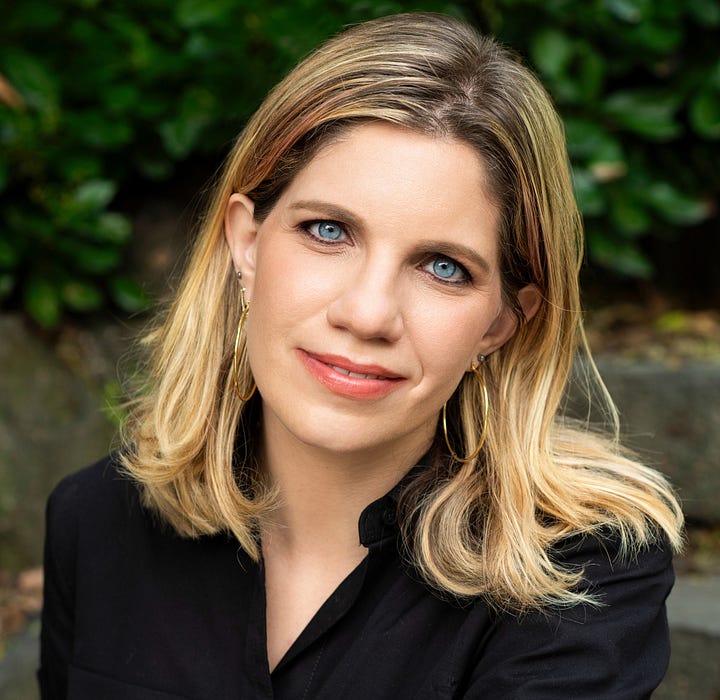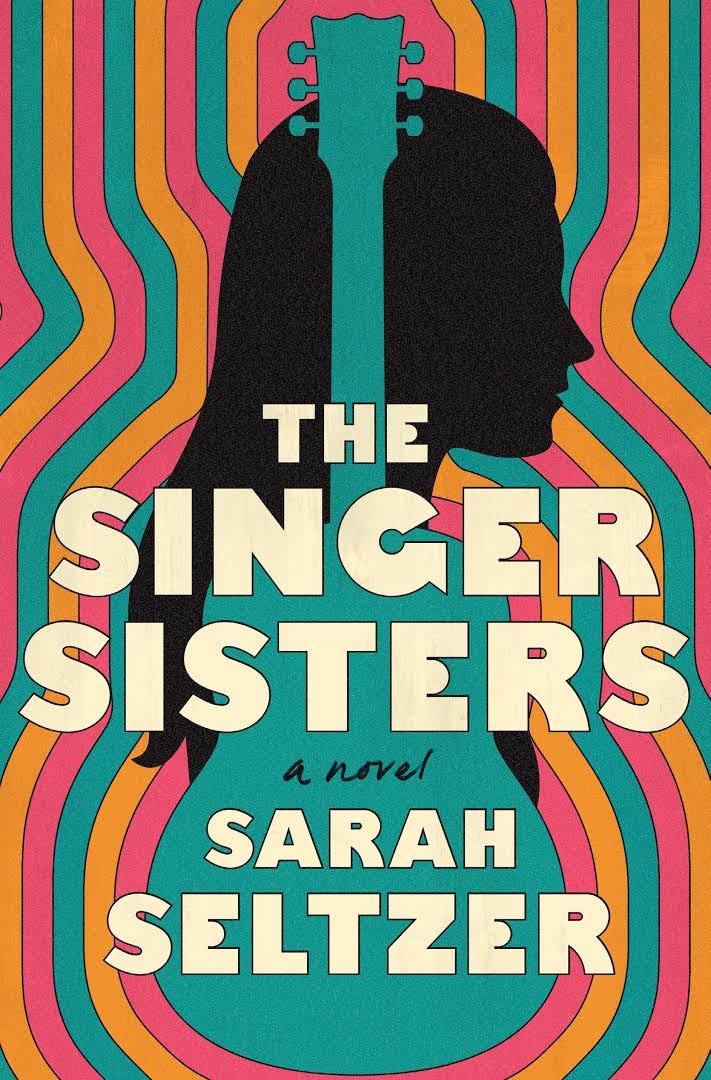

The Singer Sisters is a new novel by Sarah Seltzer, a feminist writer and editor at Lilith magazine, that follows women in a folk-rock dynasty as they navigate fame, ambition, misogyny and rivalry. It's a rock n' roll novel, but it's also a feminist exploration of how women's reproductive choices—and lack of choices—collide and intersect with their artistic dreams.
The protagonist in the section below, Rose, is a young Irish woman traveling across the USA after spending the summer nannying for folk legends Judie and Sylvia Zingerman, who were once known as “The Singer Sisters." After a heartbreaking love affair, Rose initiates an awkward one night stand, finds herself in trouble, and calls Judie for help. The irony is that she is one of the few people who knows Judie's big secret (and the story that has animated much of the novel up until this point)—Judie couldn't choose abortion back when she was a young woman in need of it.
To Rose’s surprise, the sisters leap into action to help her, and Rose, brought up to think abortion is a sin, finds the experience to be different from her fears. Judie and Sylvia are determined that this choice will open a path up for Rose, rather than shutting one down as it did for women of their generation, including Judie. While Rose recovers from the procedure, they urge her to go to college.
As a journalist who has extensively written about the way pop culture treats abortion, Sarah wanted to write an abortion scene that was neither tragic, nor laced with shame. She wanted it to be one choice of many that my female characters make—including romances they fall into, songs they write, performances they give, arguments they have. She also wanted a chance to show abortion as an example of women looking out for each other in times of need, as they have always done.
Between the drafting and publication of this book, our rights were systematically stripped, and this scene—a regrets-free, simple abortion procedure—now almost feels nostalgic. We hope in the near future, it doesn't.
1984, Chicago and New York City
Rose
When Rose hung up the pay phone in the hotel lobby, stricken, an attendant approached and asked, was she all right?
“Quite all right, thanks.”
“Wow, that accent—where are you from?” the attendant asked.
Darkness fell, violently, as a chill set in from the lake; September loomed, after all.
At a loss, and not all right at all, Rose went to an Irish pub in the neighborhood—and before she’d drained a single pint, a thin-faced boy sat next to her. He had the teeth she associated with Barry.
“You’re from Ireland!” he cried in a familiar lilt when he heard her order a second.
Around the fourth drink she invited him up to her room. His eyes lit up like a child’s on Christmas, and she pulled him out the door and through the lobby of the hotel, not caring what the kindly attendant thought. Three years of true love till she slept with Barry, and now this--ugly, quick, unsatisfying.
She practically hopped back into her pants afterward. “You can go now,” she said.
He pouted. “You have telly here,” he said. “Can’t we watch?”
What had Rose been trying to avenge with this foolishness? The condom they used was broken, she noticed as she put it in the rubbish bin with a dart of fear.
She moved on from Chicago. In Washington, DC, she walked among vast, cold American monuments. She booked a bus trip down to Florida. She sweated buckets in the sun and got a nasty burn on her shoulders. The air was so close it would flatten her into an oatcake. Florida must be close to hell. On the bus ride back up north, she must have dry heaved fifty thousand times. In a state of near hysteria, she began to run over scenes from back home in Ireland, scenes from Eamon’s deathbed that she’d pushed away: his coughs, the day they transferred him home, the contortions of pain that leapt across his thin face, Mary’s crying at night, asking Rose, “What if he’s not with Jesus?”
The sickroom smell, acid and sweet decay, her decision to finally sleep with Barry the night of Eamon’s wake, pulling him into her room, shutting the door. How they’d pressed their limbs together, her tears mingling with the sweat and blood.
Months later, her small inheritance from Eamon made a chance to put her plan into action. Mary, at the airport, said, “What’s wrong with me that I should be so small, I knew this day would come,” as they embraced.
Now, she rang Mary long-distance from Philadelphia. “I have the flu.” But she had no fever, and her nose began to bleed; she could no longer ignore that her period was late. She stalled three more days until she dialed Judie’s number, which she’d written in marker inside her suitcase.
“I’m in Philadelphia and I need an . . . operation,” she said when Judie got on the line. “I realize this is strange—” she gushed out. “Since I’m baptized and you chose not to do this, or you couldn’t--the law—but heaven help me, I cannot have a baby.”
“Sylvia will help us,” said Judie. “Tell me what bus you’re taking.”
“I haven’t got my bus scheduled—” Rose began, faltered.
“I’ll call the clinic at Bleecker Street. We’ll take care of it.”
“I don’t know what—”
“Rose. We’ll take care of it,” said Judie.
During the final leg of her bus trip, Judie’s song “Route 95” played in Rose’s head. She was the opposite of Judie in that song—defeated and sad, not hopeful or new. Rose disembarked at the Port Authority in a man’s overcoat that she’d bought for ten dollars at a thrift store in Chicago and scanned the crowd for Sylvia, who was supposed to meet her by the moving sculpture with the “ball thingy in it” on the first floor. After a few panicked wrong turns, she saw her, cool in a black leather jacket, her hair in a dancer’s bun—admirably constrained in the sea of perms around her. Her black pants brushed the tops of cowboy boots. She waved a businesslike hand and took Rose’s elbow.
“The appointment is for tomorrow,” she said. “Listen, I was scared of abortion before—before it was legal. But I’ve had two. It won’t hurt, and it’s not murder.”
“I’m so—”
Rose began to explain her mortification, and Sylvia shushed her. “You ever had Jewish deli, Rose?” she asked. “Let’s go.” She steered Rose to the front of the Port Authority—looking up, Rose saw that the green sign said Eighth Avenue—and stuck her hand in the air, queen of the city, ignoring the winding cab queue on the curb.
“Emergency,” Sylvia shouted. They got into the cab, Sylvia hauling Rose’s bag like a gunnysack.
“I sometimes do have a pastrami emergency,” explained Sylvia with a wicked grin, and Rose felt a huge balloon of tension fly out of her mouth into the city sky as she guffawed at the joke. Sylvia was a blessing.
“I was gifted with a metabolism that gallops,” she said. “I’m tall and my family are not. You’re a beanpole too—take full advantage of it.”
They alighted from the cab, Sylvia banging on the trunk for Rose’s bag.
She sidled right into a booth at the Second Avenue Deli, where the staff seemed to know her. She ordered for them both: chicken soup with something called matzo balls, a pastrami sandwich, coleslaw, pickles. For days, Rose had been nauseated, but she found herself famished—the strange, sour, salty food, the potato salad and coleslaw in small silver cups, oddly reminded her of home, and she began slurping and biting and spooning, until another wave of nausea hit and she ran to the bathroom and crouched over the toilet. Nothing came out, except retching and hot tears.
Sylvia idly twirled a spoon in the soup, her back resting against the vinyl of the booth.
“Will I see —will I see Judie soon?” Rose asked
“Tomorrow,” said Sylvia. “She’s coming. She’s with the kids tonight—Dave’s at a shindig.” She paused. “He’s always at a thing. It’s hard on Judie.”
Rose spent the night at Sylvia’s place, which was all the way east, by a river, with huge windows. Sylvia said the lights across the murky water were Queens, where Eamon had lived when he first immigrated.
“I want to be an anthropologist, or maybe a sociologist,” Rose said after borrowing some toothpaste. She hovered in her pajamas, watching Sylvia smear white cream all over her face. “Someone I met this summer told me I had the mark of a social scientist.” “Someone special?” asked Sylvia, without judgment.
She assented, flushing.
“Someone, the person who did this?” Sylvia pointed to Rose’s stomach.
“No, God, no.” She flushed deeper.
“You should stay here in the States for college. It’s better here. Judie would agree. She regrets not going. I got my BA.”
“I have nothing—no visa, no nothing,” said Rose. “I have to go back soon.”
“Oh, as for that—” Sylvia said. “We know people.”
How ironic, the briskness and kindness with which Sylvia and Judie handled her abortion. Because the next day was the most homelike thing she’d experienced since leaving Ireland, and yet it was an abortion—the last thing any good Irish girl was ever supposed to do.
Not that the doctor wasn’t terrifying! A rosary even appeared before her eyes as she lay on the table,. But Judie and Sylvia talked to the doctor, jotted things down, exchanged looks, and took Rose home to an apartment well stocked with tea,
maxi pads, and hot-water bottles for her cramping. They didn’t ask about how she’d come to be in this position. Their kindness broke Rose more than her loneliness had. She craved Mary’s hands, her low tones, even her horror and castigation. Surely the aching cramps in her abdomen were hunger pangs for Mary’s touch.
The sisters had procured several movies for her to watch, too—old ones, black and white, with beautiful stars like Olivia de Havilland and Cary Grant.
“Rose wants to stay here to go to college,” Sylvia said at some point, while they fussed over pillows and Rose was lying on the floor, trying to get comfortable.
Judie’s eyes lit up. “College?” she said. “Could you call Pam? Do you think she’d help?”
Sylvia’s old roommate had ended up at Wellesley, they explained. They listed names of people they knew—people at this office and that office, people who knew people in the government—a catechism. “Steve at the Boston office—Mom’s old friend Henry.”
“You’ll follow through, Rose?” asked Judie, kneeling and looking at her with beseeching eyes. “You want to be an—an anthropologist, Sylvia said, is that right?”
“Yes,” said Rose, half delirious with pain and fatigue and loneliness.
“College in America, yes. I want that. If you’ll help me, yes, I’ll do it. Why not?”
Excerpted from The Singer Sisters: A Novel. Copyright 2024 by Flatiron Books.

I just ordered this book. I personally had 4 pregnancies- 2 out of 4 were planned - blessed to have legitimate choice in my decision whether to have a child in those times and places. I now have 3 adult children. I will be reading this book and passing it on to them! The important thing is not the choice we make - but the ability to make the choice safely and with compassionate care. ❤️
https://www.msnbc.com/opinion/msnbc-opinion/melania-trump-book-jd-vance-wife-usha-rcna177936
100% phonies and frauds, kept shouting this a while ago but glad to see you see through their ruse: no better than Trump or Vance, Melania and Usha are complicit.
And no, Melania will turn that around the second Trump wins if he's elected: remember Kavanaugh promised he wouldn't overturn Roe, let that speak for itself, during his confirmation hearing.